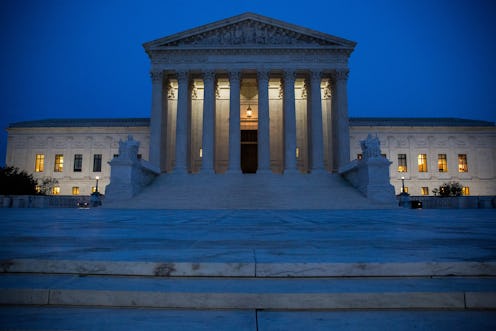News
5 Court Victories That Made 2016 Less Horrifying
It was an eventful year for the U.S. Supreme Court. In February, Justice Antonin Scalia died suddenly, leaving a seat which remains vacant and immediately launching a politicized discussion of who could possibly take his place when the winner of the 2016 election took office. In less-significant — but very notable — news, Associate Justice Clarence Thomas asked several questions during oral arguments on a case, breaking a decade of silence in the courtroom. But, as befits their jobs, the justices made a lot of important decisions this year. Here are some victories in the U.S. Supreme Court that made 2016 not all bad.
The Supreme Court had a full dance card for this year's session, and all eyes were on the justices. With many of the cases decided by an eight-member court, rather than the typical nine, there were particularly tense moments leading up to the decisions with the chance of a split on the table. But for progressives, there were plenty of wins to celebrate. Here are some of the most positive decisions that were made this year that will instruct lower courts going forward.
1. Whole Woman's Health v. Hellerstedt
This decision, made over the summer, overturned Texas' omnibus abortion law and further defined what can be considered an "undue burden" for abortion providers. In a 5-3 decision, the justices determined that Texas' law, which required physicians to have admitting privileges to nearby hospitals and that abortion providers update facilities to the standard of ambulatory surgical centers, was unconstitutional because it placed a substantial obstacle on women who sought to obtain an abortion. Ultimately, this ruling allowed abortion clinics around the state, which had to shutter under the law, the chance to reopen.
2. Fisher v. the University of Texas
Oh, #BeckyWithTheBadGrades. This ruling — another springing from the Lone Star State — upheld the University of Texas at Austin's right to consider race when looking at applicants. Rejected University of Texas at Austin applicant Abigail Fisher became the face of this suit against affirmative action when she protested that minority students with similar or less-stellar resumes were admitted over her by virtue of their race. The 4-3 decision made in June (Justice Elena Kagan did not participate in the consideration for this case) said that the university's race-conscious consideration was protected by the Equal Protection Clause.
3. Evenwell v. Abbott
And yet another case coming out of Texas. Dang, y'all. This one is pretty interesting. as it relates to a longstanding principle of American politics: "one person, one vote." In an unanimous decision in April, the justices rejected a challenge to the idea that states can draw voting districts based on the number of registered voters, rather than the total number of people who live in the district, as is standard. As the New York Times noted, this ruling tends to benefit Democrats. "Counting all people amplifies the voting power of places that have large numbers of residents who cannot vote legally — including immigrants who are here legally but are not citizens, illegal immigrants and children. Those places tend to be urban and to vote Democratic," the Times wrote.
4. Foster v. Chatman
This case reinforced a previous ruling, Batson v. Kentucky, in saying that you can't strike jurors from a trial based on their race. In this case, four black potential jurors who were qualified to serve on the jury were struck from the murder trial of Timothy Foster. Foster alleged that the strikings during peremptory challenges were racially motivated. Under the Equal Protection Clause, SCOTUS ruled that the Georgia Supreme Court failed to show that purposeful discrimination was not at play in Foster's trial.
5. Welch v. United States
This decision in April determined that Johnson v. United States, a case that was settled in 2015, would apply retroactively. Johnson v. United States tackled federal sentencing law, which Vox characterized as "the federal version of 'three strikes and you're out' laws," and added five years to sentences of criminals with four or more violent felonies or drug crimes. The court decided in 2015 that the language for violent felonies — "conduct that presents a serious potential risk of physical injury to another" — was so vague that is was unconstitutional. The move to apply it retroactively, which was made with a 7-1 decision in Welch v. United States, allowed many inmates to demand re-sentencing or immediate release.
